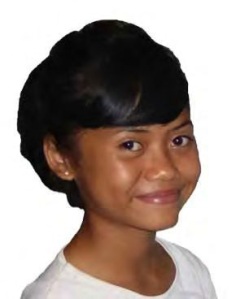
“Good morning, pak Willie! How are you today?” a cheerful voice sounds from across the small pond behind the house where I am a guest. I am in the small and remote Dayak village of Tembak that consists of some 60 families of Dayaks and the voice belongs to Mimi. Mimi lives next door. And Mimi is inspirational.
I am sitting on a wooden bench placed on a terrace connecting the old house and the new house of Nayau. Nayau is one of the descendants of the founders of Tembak. He belongs to the tribe of the Seberuang Dayak, a group that a few hundred years ago moved to this region, several hundred kilometers south of Sedjiram, the region where they originally came from. This is what Dayaks do, when their village gets too big, and the walking distance to the slash and burn fields too long, they move the whole village or split in two or more new groups.
Moving is nothing special for the former headhunters of Borneo. The forest is their home and kitchen and in the old days the forest was everywhere. Once the soil around their community starts to become less productive because of too frequent and too short cycles of burning and planting and the distance to less frequently cultivated land becomes too big, they simply take apart the communal longhouse, take the ironwood beams that have supported it for many generations before them, and move to a new location where the forest is still dense, the soil underneath is still good, where wildlife is still abundant and fish jump in the rivers.
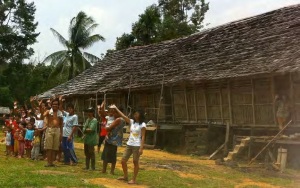
A typical Dayak longhouse where everyone shares in the burdens and joys of life. This particular one in Ensait Panjang, an hours drive north of Sintang, was saved from destruction through the support of Father Jacques Maessen, a formerly Dutch priest that is already working with the Dayaks for more than 45 years.
At this new location they build their new longhouse from the old ironwood support pillars and beams together with newly gathered roofing and walls. The old location then quickly becomes overgrown by the returning jungle and soon all that is left there are the small iron wood ‘death houses’ that hold the bones of their forefathers. After 200 years there is no trace left of the village that once was. However, the Dayaks believe that the voices of their forefathers are still there and the durian and Illipe nut trees that they planted around their old longhouses are still witnesses to the fact that they were part of this forest and may come back again here one day when their new land is depleted.
But the new greedy masters from ‘outside’ and the Indonesian national law do not recognize the ownership of that, in their eyes, abandoned forest. And thus the familiar story of slowly developing misery starts for many of the Dayaks…
Mimi lives in the village of Tembak. Tembak is still very remote and has very poor road access. It is located some three hours south of the city of Sintang, which in the past was the last trading post of the Chinese where they exchanged goods with the Dayak people several days traveling upriver by boat on Indonesiaǯs longest river, the Kapuas River. Porcelain bowls and salt amongst others were exchanged for rattan, bird nests, rare 
resins and the mysterious Gaharu perfume wood that is known abroad as Agar wood the secretive source of the amazing Oud‐perfume. The Seberuang tribe made its own road to the village that no longer has a traditional longhouse but behind which still flows the clear water of the Jengkuat River coming from the nearby Saran
Mountain. The 1758 meter high Saran Mountain that is still covered with the original beautiful majestic jungle, a jungle that Mimi knows well.
Mimi is only nine years old and she takes care of her seven‐year‐old sister Pet. The two of them live in a 2.5 x 3.5 meter large hut next‐door to my host Nayau. This hut, with a roof of old ironwood shingles and leftover materials to keep most rain out and discarded planks and tree bark as the feeble walls, is their
living room, bedroom, kitchen, their everything. Mimi and her sister once lived in another village even deeper in the jungle. But then her parents split up and she was brought here to the Tembak community. Tembak has a school. Mimi had to become an adult at the age of 6…
Mimi has long black shiny hair and her smile radiates for miles when she greets me at six thirty in the morning from behind that pond that reflects the first light towards the little terrace and projects ripples of reflected light on the ceiling. The roosters are still calling and scurvy dogs lazily stretch and scratch while waking up in their own world. The first children are already playing on the big open grounds in front of Nayau’s house. Jump and skip, skipping rope, hide and seek, running with a simple bamboo stick with a little wheel, sometimes even playing with kites. No need for electronics, just joyful interactive games for the children here. The children here do not fight and sharing comes as natural to them as drinking water. But Mimi has little time for joining the children her age. She is
the head of a family and carries important responsibilities.
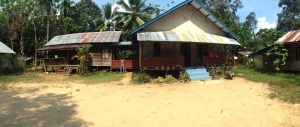
The house of pak Nayau. On the left the old one and on the right the new one with the terrace in between them from where I have written during many nightly hours. Mimi’s hut is behind the parabola to the right of the new house. The field in the front is where the children always play.
Before the first light, not yet 5 in the morning, Mimi already woke up from the bamboo floor on which she sleeps and the simple thin mat of woven Pandan strips that she made herself from the long thorny leaves she collected from the forest. She already relighted the fire from the last glowing charcoal of yesterday and adds freshly dried wood from the stack above the fire in between the stones that hold the single pan she has for cooking for herself and her sister. Then she fetches fresh water from the river behind her house and boils water for the day. When the water has boiled she carefully pours it into some old but cleanly washed bottles. This is the drinking water for today. Then she boils some rice in the rest of the water and while that is slowly cooking above the open fire she goes to the pond to take a morning bath and happily greets me.
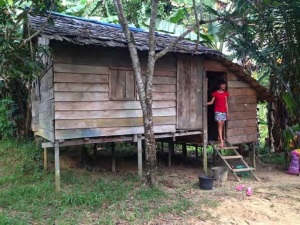
This is Mimi’s hut among the trees on a small piece of land behind the neighbor’s house where the Tembak community allows Mimi to live. August 2014.
Mimi is always happy. And so is her little sister Pet that walks closely behind here to the bath place they are allowed to share
with pak Nayau’s family. These two children are a family, the smallest one in the small Tembak village.
Mimi’s father comes by perhaps once a year and usually gives her a little bit of money. He is a pig hunter and still lives in the remote area near Serpang in a group of huts known as Pulau. His hut is located at the foot of the Saran Mountain and directly bordering the virgin forest where he hunts for the wild boars and sometimes a deer.
Her mother normally comes by twice a year and also brings some money and clothes for Mimi. She lives in a gold miners’ camp far away, where she cooks for the men that sift the sand for gold dust and poison themselves with mercury to separate the precious metal from the rest material. And once or twice a year Mimi and her little sister Pet walk to that village of her father some 30 kilometers away over old abandoned and overgrown logging roads and tracing hunter paths and crossing small streams. The girls walk and wade barefoot so that their footwear for the school does not wear out too fast. Mimi is not afraid to walk there, because she will go the trail together with some people from a neighboring village, but she could do it by herself she says with confidence. Once Mimi and Pet even walked across the mountains to find their mother when they really needed help and they got lost. Fortunately, after walking from ͺ in the morning till almost dark at in the evening, someone helped them and the two children found their mother’s gold miners’ camp.
After the morning bath it is time to eat the cooked rice together with some salted fish. Mimi cooks some fern leaves from the forest that she picked on the way back to her hut to boil in the last water with the rice. Sometimes Mimi will find the strange purple shoots of the creepers of a plant the Dayaks call Remudang in the jungle that taste really good. And she knows what mushrooms will not make her sick. The rice and fish, and very rarely a piece of meat from some animal from the forest that is given to her by the other villagers, are her daily routine. As is washing the few clothes she and her sister own, and Mimi and Pet always look clean in impeccably washed clothes. Next to the river grow the trees with saponine‐containing leaves that she can use to do the washing as if she were using regular soap.
As a family Mimi and Pet have the right to use communal land but Mimi is not strong enough yet to make her own slash and burn agricultural field to grow rice and she has to get ready to go to school. But she grows some chilli pepper and herbs behind her hut that she fertilizes with the ash from her fire. And she is good at collecting edible leaves from the forest that she can sell to her neighbors to pay for the school fees. And she already knows some medicines from the forest for when she is sick. And she knows the special leaves from the jungle that will make the water taste sweet without sugar. And Mimi knows the birds in the jungle. As young as Mimi is she already is a real Dayak.
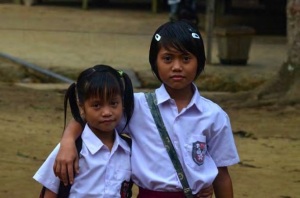
Mimi and her sister Pet ready to go to school in their primary school uniforms, freshly washed. March 2011.
While I am still typing on my computer in this inspirational spot with its sunbeams projecting through the smoke of the morning cooking fires, Mimi passes by the front of the house, again impeccably dressed in her red and white school uniform and closely behind her follows her sister Pet. ‘Have a nice day pak Willie!’ she calls out with that lovely sincere smile of her radiating sincere happiness.
Mimi attends the village meetings, as young as she is, as the head of her little family. She is there when we discuss the sugar palm project; she listens intently when we talk about the orangutans and the clinic. Mimi aspires to become a vet and help the animals. She attends the harvest ceremony with the village elders. Mimi does very well in the nearby village school and has top grades. More, she even teaches a little group of younger children. This beautiful little happy child is such an inspiration! In the evenings she studies for her homework near the light of a candle or a bamboo filled with resin from the forest that keeps burning all night and at the same time keeps mosquitoes away.
When I offered for Mimi to go to boarding school in Sintang the elders had a meeting. They concluded that it was better for Mimi to stay in the Tembak village. She had a good position here and they could all keep an eye on her if she would need help. It turned out they would sometimes give here some tea, spoons, share fish or bring some other vegetables and fruit. And the money from her father and mother was enough for her to buy the few clothes she needs. And I realized that indeed there was no need for me to take pity on Mimi and try to change things. This Dayak community is doing just fine! Their ways of life bring more happiness to the children and the families than all the modern comforts of life can offer. Here in the village of Tembak life is good and the water is clean.
They even have their homemade mini‐hydro. But most of all they have each other!
Hard work is no punishment. It can give satisfaction, a feeling of achievement. The Dayaks are happy, Mimi is happy. When I visit so many of these Dayak communities in the interior of Borneo I feel so angry to see how these ‘modern’ outsiders come to bring ‘the joy of development’. We bring jobs with our oil palm they proudly proclaim! Roads that will give you access to the modern world. Your children can study in the city then! But ͻͲ% of the Dayak students fail school after one year in the city… Alcohol, drugs, mobile phones, the wonders of modern life… Soon they are broke and broken. Laughed at. Often, when they go back to their village, they demand that their parents sell their land so they can buy motorbikes and have more fun in the city nightlife.
The previous paragraphs I wrote some three years ago. Today I met Mimi again. Her hut outside still looks the same but has been extended somewhat to one side and there are more cooking pans now and she even has a mattress now. She and her one and a half year younger sister, 13 and 12 years old, were taking care of Indun, their sick mother who had left the gold miners’ camp with a fever and now seems to have decided to move in with Mimi… Last year Mimi was even sent two more children from her birthplace to care for but they have moved to another place. Now she is taking care of a family of four…
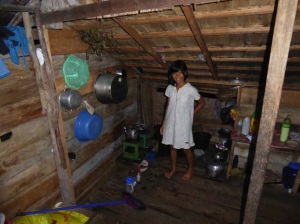
Mimi in her little hut. August 2014. More pots and pans now than when she and her sister Pet first started living in this hut as an independent family 7 years ago. But Mimi’s smile, confidence and happiness has not changed a bit.
Her mother Indun who no longer works, is only 37 years old and married when she was not yet 12. Her eldest daughter Onuk is now 23 years old and Onuk’s oldest son Dian is 10 years old… And Dian now also lives in the care of Mimi because back in Pulau there is no school! Mimi’s responsibilities have grown considerably. But two Australian teachers that visited our project have donated some funds so that this week Mimi can buy new shoes about which she is really excited! Now she is 13 years old, Mimi also has to work tapping the rubber trees besides the school. During the school holiday she earned 10 USD in seven days of hard work! And she is proud that she can help her sick father and three older siblings that live in the far away Pulau village.
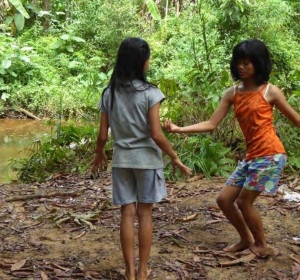
.Mimi and her friends practicing for the exciting adventure of going to another village to dance in public for the first time.
With that wonderful smile and confidence Mimi tells how it has become harder to find vegetables in the forest, but that she still finds time after school to play volleyball. And she likes to sing and dance! In two weeks she will go on a sponsored event with her traditional dance group to a remote village, so the eight girls are busy practicing in the afternoons in an open spot in the forest along the Jengkuat river. And Mimi is good at playing chess too. Mimi is smart and still steadfast about wanting to become a veterinarian and now also speaks English so she will be able to read the scientific books. Sometimes
Mimi visits our orangutan clinic. And Mimi has some business acumen too. When Agung, the son of pak Apui that lives across the street recently got married, Mimi opened a little stall selling drinks to the many visitors.
She tells me that someone recently asked her to move to the city and live with a family there but she refused, because she is happy here in Tembak. Her hair is shorter now and she is growing tall, already taller than her mother. But Mimiǯs smile and happy constitution have not changed a bit! Tonight at 9 o’clock, after having washed the dishes of the evening meal she cooks for her family of four and even baked some cookies with Dara, the the wife of pak Nayau who has an small metal oven box that can be put above the fire to bake things. Soon Mimi will sleep tired but happy.
Mimi divulges to me that she has told Sanggung, her father, and Lipun, her ͳͺ year old brother, not to kill animals in the forest anymore and for three years now already they have stopped! She feels very good that they did that. Now they grow rice and vegetables and sometimes catch fish in the river. But she also knows that the oil palm companies have sent people to Pulau to entice the people there to give up their land. Fortunately they can now sell their Illipe nuts to the new mini factory in Tembak. So they know their forest has value. And someone collected a piece of Gaharu wood from their forest, less than a kilogram heavy but worth ten thousands of American dollars. Her father knows how to find Gaharu so maybe he can find another piece and get a good price, not being cheated by the many eager middlemen that control the murky trade. And soon, Rafflesia flowers will bloom and perhaps people will come to see them in the Saran forest. So Mimi will also tell her village not to believe the oil palm companies and give up their land and forest.
I know we cannot stop development but I cannot stop thinking that this cannot be right. We are depleting the world’s resources and hurting everyone. To me it seems that many people in the modern society mostly seem bored and are merely looking for sensation, always wanting more and different new things.
Selfishness. Unhappiness. Robin Williams. I briefly met him at TED in 2019. Now
I just read of his depression and suicide. A man that brought so many smiles to so many people. There at TED he did not look so happy though and I remember wondering. I saw him switching on his smile when meeting certain people. Mimi’s smile comes from her heart, her whole being.
I feel privileged that I can bring some smiles to others. I hope that our work with Masarang and Orangutan Rescue can bring many. Terima kasih. Indonesian for ‘Thank you’. Literally though it means: ‘receive what you give’. I dream of that, that we can all give and share to make our world a better place. The dream still exists in places like Tembak. And most of all in the hearts of persons like Mimi.
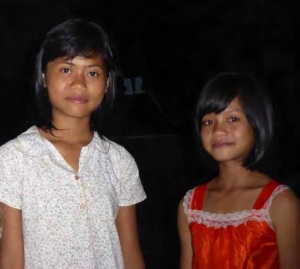
Willie Smits
Tembak Village, August 20th, 2014
A confident looking Mimi and her younger sister Pet. A small independent family for seven years already. Tembak, August, 2014.
Leave a Reply